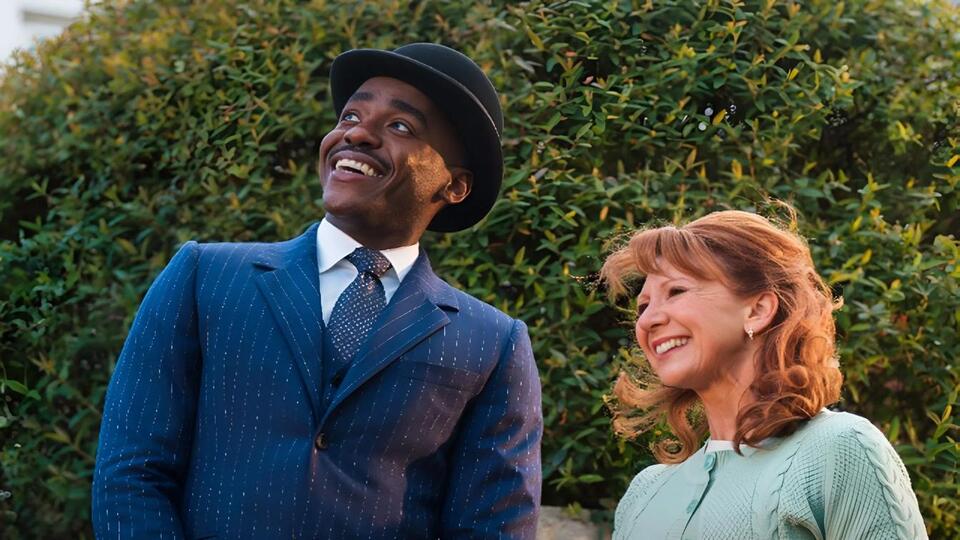TL;DR: “Wish World” is a delirious, densely packed alt-reality romp that wants to say something sharp and resonant about fascism, imagination, and the ghosts of Gallifrey. But under Russell T Davies’ signature maximalist chaos, it’s both dazzling and maddening—one third incisive satire, one third uncanny horror, and one third technobabble-induced migraine.
Doctor Who season 15
There’s a certain brand of Russell T Davies storytelling that feels like you’ve tripped into a fever dream fueled by late-night Wikipedia deep dives and a half-empty glass of rosé. “Wish World,” the seventh episode of this wild second season, is exactly that—but with the haunting laughter of Omega echoing through your Bluetooth speaker while a fascist reality-TV show blares in the background. Yes, it’s that kind of episode.
We open with a witch in the woods. The Rani, that glorious chaos muppet of classic Who, rides into 1865 Bavaria like she’s starring in her own goth reboot of Frozen. There, she kills a woman by turning her into violet petals and transforms children into ducks. I’ll say this for Davies: the man commits. This isn’t just villainy—it’s fable-coded absurdism with teeth.
But then we’re in domestic bliss with the Doctor, now going by John Smith, living in a 1960s pastiche household with his wife Belinda and daughter Poppy. The aesthetic? Leave It to Beaver as designed by David Lynch. Every slip in reality (literally: mugs keep smashing to the floor) chips away at the illusion. And then Ruby Sunday arrives, like Dorothy crash-landing in a world made out of white picket fences and psychological warfare.
The good news? The first half of “Wish World” is electric.
Davies crafts a twisted utopia that thrives on conformity, paranoia, and smiling through your own erasure. This is Stepford horror reimagined for an era of culture wars and quiet despairs. Conrad, our fascist dreamweaver perched atop a bone tower, represents a very modern evil: an alt-right influencer who weaponizes nostalgia, bigotry, and fantasy to reshape the world. It’s all painfully relevant.
And that’s where “Wish World” shines: in its savage satire. Women who aren’t wives or mothers are deemed useless. Queer affection is criminalized. Disabled people like Shirley Bingham are discarded. It’s a metaphorical hammer, not a scalpel—but the impact lands hard. The Doctor’s fake reality has the texture of utopia, but it smells like stale dictatorship.
Sadly, that promise buckles under the weight of too many ideas in too little time.
Ruby’s arrival jolts the narrative too early—removing the audience’s chance to sink into the dread. And while the world-building is gorgeous and grim, the back half of the episode becomes a tidal wave of exposition, nonsense plotting, and surreal detours. The Rani monologues like a villain in a PlayStation 2 cutscene. The dialogue turns to sludge. And Omega—the ancient Time Lord scientist last properly seen when Nixon was still in office—is teased as the great cosmic endgame.
Look, I’m not mad that Davies is reaching into the mythological toybox of Gallifrey. I’m a nerd; I live for deep cuts like the Seal of the Prydonian Chapter. But the pacing here suffocates any real emotion. Ncuti Gatwa, radiant as always, is left standing around looking vaguely concerned while the Rani blathers about underverses, stolen timelines, and weaponized doubt. None of it makes sense. And worse, none of it feels like it matters.
Thematically, there’s something here. Omega and Conrad both sustain reality through force of will. Both are creators of imaginary worlds that trap and distort. There’s a comment to be made about masculinity, empire, and broken creators who see themselves as gods. But the show can’t quite connect the dots.
And then there’s Poppy. She’s the twist, the fracture, the thread that might unravel everything. In his final moments, the Doctor yells, “Poppy is real! Don’t you know what that means?” as he falls into a void. It’s a great hook—but it’s buried beneath so much noise, it nearly gets lost.
What frustrates me most is how close this episode comes to greatness. Strip out 10 minutes of exposition. Let the dread simmer longer. Save Ruby’s awakening for the midpoint. There’s a phenomenal, haunting story here. But Davies rushes to the fireworks factory, and when we arrive, the rockets are made of wet cardboard and fanservice.
That said, the design is gorgeous. The bone tower is the kind of visual Doctor Who rarely pulls off. The retrofuturistic UNIT office feels like Mad Men via Orwell. And the scene with Rogue on the screen—just long enough to say “tables don’t do that” and declare his love for the Doctor—is one of the weirdest, sweetest moments in the show’s history.
Is it a mess? Absolutely. But it’s a glorious one. And I’d rather take this bonkers misfire over a safe, formulaic bore any day of the week.
“Wish World” is a surreal rollercoaster of fascist fantasy, memory puzzles, and Time Lord lore overload. When it hits, it hits hard. When it stumbles, it drags the episode into an underverse of its own.






